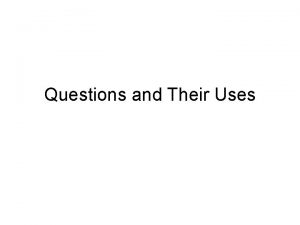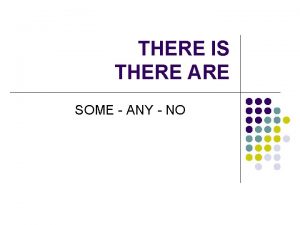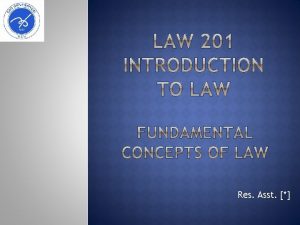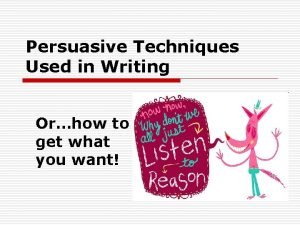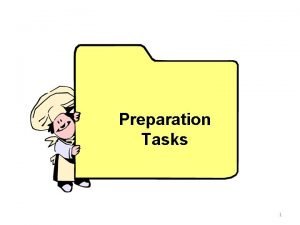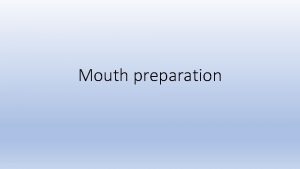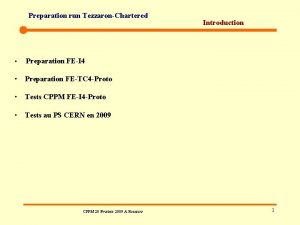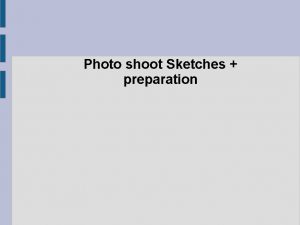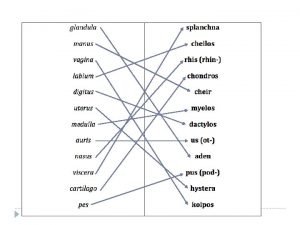Match Preparation TO DO JUSTICE TO ANY MATCH



















- Slides: 19

Match Preparation TO DO JUSTICE TO ANY MATCH, IT IS ESSENTIAL BEFORE THE MATCH THAT BOTH UMPIRES SET ASIDE SUFFICIENT TIME FOR PREPARATION. SOME THOUGHT CAN BE GIVEN TO IN THE COMFORT OF YOUR OWN HOME. BUT MOST OF YOUR PREPARATION WILL TAKE PLACE AT THE GROUND THEREFORE IT IS RECOMMENDED THAT YOU ARE CHANGED AND AT THE PITCH AT LEAST 45 MINUTES BEFORETHE START

PRE MATCH and discussion points We have no intention of telling you how to umpire – this will be done by our Coaches. What we do list here a few ‘pointers’ that are designed to stimulate your discussion before the action starts. This, we believe helps us to deliver a better product to the clubs. PLEASE DO NOT SPEND TOO LONG ON ANY ONE ITEM IN THE DISCUSSION POINT LIST – YOU WILL NOT GET THROUGH ALL THE TOPICS Pre-match preparation begins with contacting your colleague a few days before the game to confirm when and where you will meet and to coordinate your dress. There are 3 things that underpin the management of a game by the umpires – Control, Consistency and Communication. Always remember that you are the ‘ 3 rd man’. Support and be seen to suggest your colleague. Supporters, players and coaches will notice it is worth remembering that you cannot make a bad game ‘better’ and you cannot please everyone all the time. Good luck!!

DISCUSSION POINTS BEFORE THE DAY OF THE GAME Meeting point – Decide where to meet 45 minutes before the start. Match status -It is dangerous to take preconceptions into a game. Discuss which team is likely to be stronger and their league positions. What style of play do you expect? How will we adapt if we guess wrongly? Umpire attire – Make sure your choice of colour is suitable for teams and background. League/Cup rules – League and cup rules (e. g extra time)

DISCUSSION POINTS ON THE DAY OF THE GAME (including CO-OPERATION & POSITIONING) Determine your areas of control where you are likely to need to help from your colleague. How do you want that help to be given? Consider your colleague’s distance from the offence and the size of the decision. Regular eye contact Where will you be for the set pieces? Your circle under your control? Your colleague’s circle? How are you going to support each other?

DISCUSSION POINTS ON THE DAY OF THE GAME (including CO-OPERATION & POSITIONING) What will you do if you see an offence in your colleague’s area of control that your colleague hasn’t spotted? How will you know if your colleague hasn’t spotted the offence? What will be your procedure for recording goals? What will the less engaged umpire do when a goal is scored at the other end? How will you communicate if you disagree on key decisions? (i. e normally goals)? Consider what happens if you don’t show a card? What will you do if someone else commits the same offence? Agree in advance of the game starting and communicate to Captains ….

DISCUSSION POINTS ON THE DAY OF THE GAME (including CO-OPERATION & POSITIONING) Substitutions need to be on the designated side of the pitch within 3 metres of halfway. Where the suspended players will sit/stand Procedure if any U 18’s are suspended Procedure for substituting goalies with out field players or kicking backs

CONSISTENCY Players get understandably upset if each umpire gives a different decision for the same ‘offence’. Most players will stay within the boundaries that the umpires set. That becomes difficult when the boundaries of acceptable play appear to differ between colleagues. q Discuss what you will do if …. q Players do not retreat 5 m at a free hit before the ball is played? q Players knock the ball away, or move it to where they think a free hit should be taken? q Players commit a foul involving intentional or avoidable contact? q Players use intentional stick contact. Will you treat minor intentional contact differently to a major contact?

CONSISTENCY q Players verbally intimidate each other? q Players repeatedly play the ball from the wrong place or hit a moving ball? q Players play the ball above shoulder height? q There is player, coach or supporter dissent? q A ball is lifted into player? Discuss the speed of the ball, height of the ball, and the ability of the player to safely play the ball (this maybe determined by the distance the ball has travelled) q Players ‘throw’ an aerial ball? Consider the location of players in the take off and landing areas the ball accidentally makes contact with a player’s foot.

CONSISTENCY q For each of the examples consider location on the pitch, time in the game, any previous offences and the likely outcome if the offence wasn’t committed. When will you and your colleague use a loud whistle, or give a card? q Consider when will you use a quick whistle and when will you play advantage. q Sometimes the biggest advantage to the attacking side is that you delay giving a personal penalty (no matter how serious) until play goes dead. Use common sense.

COMMUNICATION With players As an umpire you will have a personal style when it comes to communication with players. q Consider how you will speak to players if it is necessary q Will you verbally reprimand or just use whistle tone and cards? q Will you approach players, invite them to join you in a neutral space or request they come to you? q Do not invite dialogue. Do not ask questions, make statements. q There can be a fine line between a relaxed light hearted attitude to the players and a familiarity that invites a discussion of decisions. q Above all remember to support your colleague in every way both verbally and non-verbally.

COMMUNICATION Communication with your colleague q Players, coaches and supporters will recognize when umpires are cooperating. Taking time to exchange eye contact, wearing a cap or sunglasses may prevent this. q Take time to ensure that your colleague knows to which player you have given a card and what reason. q Double whistling – what will you do when you both blow together and point in opposite directions? Remember to give players time to get into position. q How will you indicate to your colleague if you need to extend a yellow that he/she is controlling?

Communication Whistle selection q Try and use the same type of whistle q Is the venue known for difficulties with; - q Two games going on at the same time? q Weather conditions? League/Cup Rules q If appropriate agree with the. Captains and Coaches in advance of the game

Communication Players Dress/Ground Equipment q Confirm shirt numbering. Are there duplicates? q Captains armbands q Goalkeepers smocks q Ball colour (different to the players socks) q Walk around the pitch during your chat to note obstructions etc q Pitch markings. You can do little about this other than advise the home team q Goals. Use your entitlements – the home is responsible q Floodlights

Communication Deciding ends q Consider the location of crowd and bench q If you are the junior umpire consider expanding your skills by taking the side of the pitch with the benches q Sunlight, caps etc. Who takes the sun? Timekeeping THIS LOOKS LIKE A LONG TOPIC BUT IT SHOULD BE COVERED IN UNDER 2 MINUTES q Who to time the first half? q What if under pressure after 35 minutes q What if PC in dying seconds? Who to blow?

Communication 1 or 2 minutes to go? Agree signal for half minutes. INJURIES q Who will stop the game? q Err in direction of caution especially (head injuries/u 18 s etc) q Ball out of cage q What signal will be used for the watch stopped/broken/not restarted? q Blow the whistle to start and restart after goals or stoppages q Ensure your colleagues is ready to restart the game q Coaches and Managers keep time as well

Communication POST MATCH KHUA believes it is essential to allow adequate time after the game to discuss the various incidents in the game with both your colleague and the players/coaches. You should use post match time wisely. You can learn as much in the bar as you can from the practical. Here is a shortlist to start you off on the post match experience q Discuss the game with your colleague q Support your colleague (even after the game is over) q Talk to the coaches, captains and any other interested parties. Admit mistakes, if any. q Do not abuse the KHUA badge you have earned (or are trying to earn)

Communication q Follow the codes of conduct and KHUA will support you q Uphold the reputation of KHUA at all times q Support your colleagues from all previous matches at all times q Do not abuse a fellow umpire (remember this applies when playing as well) q Remember your obligations If there have been red card/s and/or MMO’s q Make notes after the game while lessons and questions are fresh in your mind q There is always something to learn q FINALLY remember that your next game is the most important of the season

QUICK CHECK LIST FOR PRE MATCH q Control q Consistency q Communication q With the players q Use the whistle q Use entitlements q With your colleague q Rules q Whistle q Players Equipment q Deciding ends q Timekeeping q Eye contact

QUICK CHECK LIST FOR PRE MATCH CONTROL – Aware of team levels. Keep it tight early – open up later if possible e. g 5 m, still ball, defence hits COMMUNICATION – with each other e. g eyes, thumbs up, whistle – with players – empathy, positivity, verbally CONSISTENCY – of approach e. g PC set up, shoulder height, 23 m PC’s, ladder, other decisions RESPOND TO CHANGE
 Seknder
Seknder There aren't any carrots
There aren't any carrots Any to any connectivity
Any to any connectivity Prayer before meeting
Prayer before meeting What is environmental justice
What is environmental justice Justice for jenny
Justice for jenny Adliye ordinary justice
Adliye ordinary justice Criminal justice lesson
Criminal justice lesson Miscellaneous jeopardy categories
Miscellaneous jeopardy categories Criminal justice the essentials 5th edition
Criminal justice the essentials 5th edition Grass eater vs meat eater police
Grass eater vs meat eater police Guelph university criminal justice and public policy
Guelph university criminal justice and public policy A view from the bridge law and justice
A view from the bridge law and justice Aristotle on justice
Aristotle on justice Justice.gov.ma registre de commerce
Justice.gov.ma registre de commerce Examples of understatement
Examples of understatement Jmu criminal justice minor
Jmu criminal justice minor What is integrity of creation
What is integrity of creation Restore verb
Restore verb Liberty and justice for all
Liberty and justice for all
